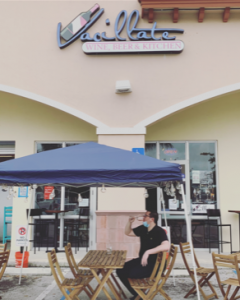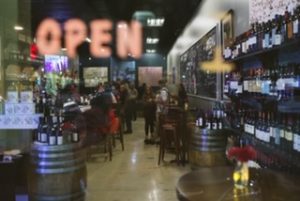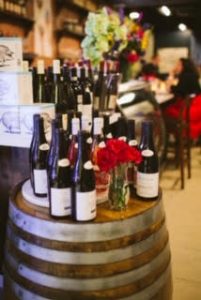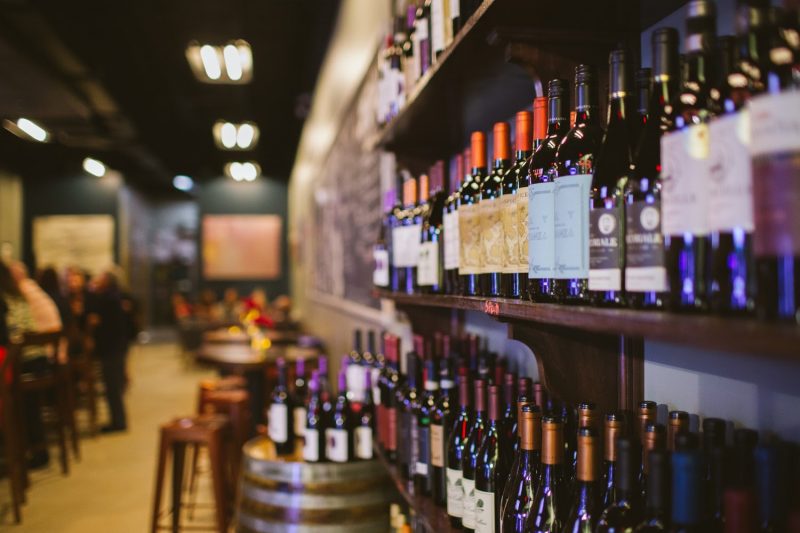This week, Michael McCann will be throwing open the doors of his popular Vacillate Wine and Beer Bar and welcoming customers in, adhering to the county’s list of Covid-19 guidelines as well as his own high safety standards.
“We are so happy to be opening up,” said McCann, as he was readying his inviting restaurant for the return of indoor dining at half capacity. “All of our super strict sanitization procedures are still in place. Tables are all 6 feet apart and mask use and social distancing is strictly enforced. Six people max per table if in the same family, four max if not. The restaurant will continue to close early (10 p.m.) as a result of the daily curfew that is still in place.”
The former 5th grade teacher and college professor followed his heart and made a career change a few years ago, quickly getting certified as an Advanced Sommelier. After working at a few establishments to learn the ropes, McCann opened Vacillate in January 2019. Even being so new, Miami New Times readers voted Vacillate the Best Wine Bar last year.
The Kendall restaurant specializes in a large selection of wines from around the world and a full menu of charcuterie plates, gourmet sliders and Spanish tapas to pair with the wine. Before the pandemic, it was also the gathering spot for wine tastings, wine dinners and live entertainment, including occasional comedy nights. Vacillate can easily accommodate more than 50 diners inside, but will be serving half that number under the current restrictions.
Over the last five months, McCann has been doing whatever he can to survive the pandemic’s assault on the economy,. His industry has been hit the hardest.
FIGHTING BACK
McCann quickly added delivery service early in the COVID-19 shutdown, something Vacillate had never offered before. Vacillate joined restaurant delivery platforms and overhauled the delivery menu – think meals, not tapas. Some of the menus favorites stayed but in larger portions, and McCann added more pizzas and burgers.
When indoor dining was opened briefly and then closed again in early July, he talked a very reluctant landlord into allowing the restaurant to have outdoor seating temporarily for the first time. That also meant McCann had to purchase outdoor furniture, tents and lighting. Four tables for dining was certainly better than nothing – but Miami’s summer weather takes a toll.

McCann applied to just about every loan or grant he came across, including a new hospitality grant he is hoping to be approved for soon. He received a PPP loan, though it was only enough to cover about one month of payroll instead of three because the amount was based on last year’s payroll, which was much smaller.
He did have to lay off employees, but was able to hire most of them back quickly. A good sign is his small team has stuck with him – even with reduced hours or having to do different jobs – because they wanted to see the restaurant stay open. “They were flexible with me – they really wanted to keep their jobs – and I made a promise to do whatever is in my power to keep them in their jobs.”
Staying afloat also meant going “tightwad on the purse strings,” temporarily axing the marketing budget, dropping live music and canceling subscriptions. He also contacted his utilities to set up payment plans and dropped his TV service temporarily since the indoor restaurant was closed.
GENERATING NEW REVENUE STREAMS
Creating new revenue streams where possible was also on the table, McCann hosted virtual wine tastings for local clients and even for a bank in Oklahoma. He started selling the wine for delivery, not at restaurant prices but rather at liquor store rates. Especially popular: A special selection of wines perfect for quarantine living – such as vino to create a playlist by or to pair with the family dinner.
 Although starting this week indoor seating is allowed again, “we will continue our outdoor seating area as there are still some people who are uncomfortable coming inside,” the restaurateur said. “And we are still allowed to do the outdoor dining, so we will still be taking advantage of this.”
Although starting this week indoor seating is allowed again, “we will continue our outdoor seating area as there are still some people who are uncomfortable coming inside,” the restaurateur said. “And we are still allowed to do the outdoor dining, so we will still be taking advantage of this.”
The details may differ, but McCann’s story is eerily similar to hundreds of other restaurant small business owners who are trying to chart a course to survive the global pandemic, with so many unknowns ahead. Unfortunately, there’s no playbook for the current reality.
Restaurants generally have low profit margins, between 5% and 6%, and they achieve that only if they have a full house most every day they are open. They also tend to have only about two weeks cash on hand, said Sean Kennedy, executive vice president for the trade group National Restaurant Association, in an Associated Press report.
CLOSINGS ARE GROWING
In the Sunshine State’s restaurant industry, more than 2,000 restaurants have closed, according to the Florida Restaurant and Lodging Association, a trade group. These include some iconic names in South Florida.
On the very day that the county is allowing restaurants to reopen at 50%, the longstanding South Beach Cuban eatery David’s Cafe Cafectito said Aug. 31 will be its last day in business after 42 years, blaming the closure largely on the pandemic (the Miami Herald reported the restaurant was also 5 months in arrears on rent before the pandemic and faced eviction), Meanwhile, Rio Cristal, a Westchester Cuban family restaurant business that has been serving customers tender Palomilla steak beneath a pile of fries (the #51 Super Rio Cristal Steak) and other specialties for 46 years, also announced it would be closing Aug. 31, but the restaurant now has changed its mind and will stay in business due to an outpouring of customer support, it said.
But there will be no change of heart for Coral Gables’ pub John Martin’s though. Owner Martin Lynch had already planned to close the business, but COVID-19 sped up the decision. “We’ve been at it for 31 years, and it was time to pack it in,” owner Martin Lynch told to the Miami Herald. “The joint will always maintain an iconic spot in the hearts of Coral Gables residents,” its note to customers said.
And after 21 years of business, Coral Gables fine-dining favorite Ortanique on the Mile abruptly closed in July, citing the two years of street construction and the ongoing COVID-19 pandemic as the reasons. Other closures include many restaurants that have made a name for themselves in their relatively short lives. Among them is Wynwood’s Concrete Beach Brewery, the Upper East Side’s Cake Thai, Gregory’s Diner at the Vagabond, and chic Italian eatery Le Sirenuse.
But what happens if the numbers on the balance sheet say “close” but your heart isn’t going along?
MORE THAN A NUMBERS GAME
Raju Mohandas, a consultant with Florida SBDC at FIU who helps entrepreneurs grow their businesses, says there are many factors that go into a business owner’s decision on whether to close.
If it were just pure numbers, the decision would be easier, but there are many subjective factors to consider, he said. Do you still have the energy and the passion to continue? Is your family on board with your decision? Is your health OK? Are your business partners on board with this or will you be going it alone? You have to consider your socio-economic situation and whether it is providing what you need and want.
Other important questions to ask yourself: Did you have a good business model before the pandemic? Are your customers loyal, crazy loyal? Are you committed to do whatever it takes to move forward again – even if that means pivoting the business model and/or borrowing money, which will extend the time it takes to get back on track?
“An entrepreneur’s journey is pretty lonely — you are wearing all the different hats,” said Mohandas, who has owned his own businesses and worked as a turnaround specialist. “What goes through your mind every morning when you wake up? If you are sick and tired of wearing all the different hats, maybe it is time to hang it up.”
Yet, Mohandas has worked with a number of entrepreneurs where the numbers showed a disaster but they were able to turn it around. The common ingredients: Passion and Perseverance.
It even happened to him. After Hurricane Andrew, his own business was devastated. “My accountant told me, ‘you’re done’.” he said. But he wasn’t, and with hard work four years later his business was ranked No. 74 in his industry nationwide and he sold it on his terms.
With clients who are going through financial distress or a crisis beyond their control such as the current pandemic, Mohandas tries to lay out what their next two or three years are likely to look like. It’s a reality check. Are they still all-in?
 READYING FOR REOPENING
READYING FOR REOPENING
For McCann, he says his plan it to keep going as long as he can because he loves what he does, but he is also considering developing a stronger additional revenue stream with his expertise, such as a sommelier podcast.
He believes the fact that his team is lean and his space is small helps. Many of the closures have been larger restaurants with high overhead.
“I think a lot of people get stuck in their ways. We are small but mighty.”
So on Tuesday, Michael McCann will open Vacillate Wine Bar’s doors wide and invite customers inside again at his inviting space at 15512 SW 88th Street. Indoor and outdoor seating is available — no reservations required.
The photo at the top of this post and the ones throughout are of Vacillate Wine and Beer Bar and were provided by Vacillate.
Please send GrowBiz topic suggestions and feedback to GrowBiz@FIU.EDU.
READ MORE ON GROWBIZ, including our series on cash flow for small businesses:
Healthy cash flow keeps your business afloat. Here’s how to manage it.
Smart strategies for generating cash flow – in times of COVID and always
Cash flow is king: Be proactive, not reactive, to save your business

